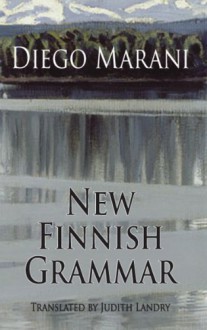| Diego Marani, New Finnish Grammar (trans. J. Landry). London: Dedalus, 2011, p. 56. |

| Diego Marani, New Finnish Grammar (trans. J. Landry). London: Dedalus, 2011, p. 56. |

A melancholic yet eerily captivating story about a young man who has been so severely injured he loses his memory and speech ability, set in WW2 Europe. He is taught the Finnish language from scratch by the Finnish doctor, who supposes his patient is a Finn from the 'Sampo Karljanen' tag stitched on the clothing he was wearing when discovered lying beaten to near death on a German quayside, of a nearby ship he was taken upon, then as soon as he garners a minimum ability to reproduce the unconventional phonetics of the Finnish lamguage is sent to Finland, out of the hope that among the icy, unforgiving Nordic landscapes he will discover some trace that will unfurl his memory and help him rediscover his identity.
Exquisitely written, I enjoyed the fact that I was able to relate to the protagonist's feelings of existential crisis and being not just a foreigner in his adopted country but, worse yet, a stranger among all people, incapable to chivvy himself into establishing a profound connection emotionally or intellectually with them because of incertainity about his identity, a great deal. The story ultimately magnifies the importance of language and the memories, history of times erstwhile it keeps alive within its particular anomalities to the future of a nation, as well as the effect memories and language have on individuals. The storyline made me recall plots involving characters pursuing happiness while holding the foolish presumption that happiness isn't a temporary state of mind, that it is something that should be felt at all times, for its similarity to this one in the sense that the protagonist was also pursuing something intangible, within the ruminations of ancient land and the souls of the surrounding people,- his memory and subsequently his identity, esentially his heart, as an individual who seeks to create substantial meaning in his world. It made me wonder about the inextricable connections between memory, language and happiness, three rudimentary aspects of human life.
Additionally, I highly appreciated the references to and supplementary insight provided regarding the Kalevala epic throughout the text, which added a sense of the mystic to the work and gave it a multifaceted finishing. In short, this is a book which has carved a niche to occupy in my heart.

bookshelves: translation, published-2000, italy, one-penny-wonder, paper-read, finland, under-500-ratings, wwii, summer-2013
 Translated by Judith LandryTo Simona, Alessandro and ElisabettaEi Suomi ole mikaan kieli, se on tapa istua penkin paassa karvat korvilla. Paavo HaavikkoOpening: My name is Petri Friari, I live at no.16 Kaiser-Wilhelmstrasse, Hamburg and I work as a neurologist at the city's university hospital.Some terrific POVs and (once settled into) lyrical writing.
Translated by Judith LandryTo Simona, Alessandro and ElisabettaEi Suomi ole mikaan kieli, se on tapa istua penkin paassa karvat korvilla. Paavo HaavikkoOpening: My name is Petri Friari, I live at no.16 Kaiser-Wilhelmstrasse, Hamburg and I work as a neurologist at the city's university hospital.Some terrific POVs and (once settled into) lyrical writing.